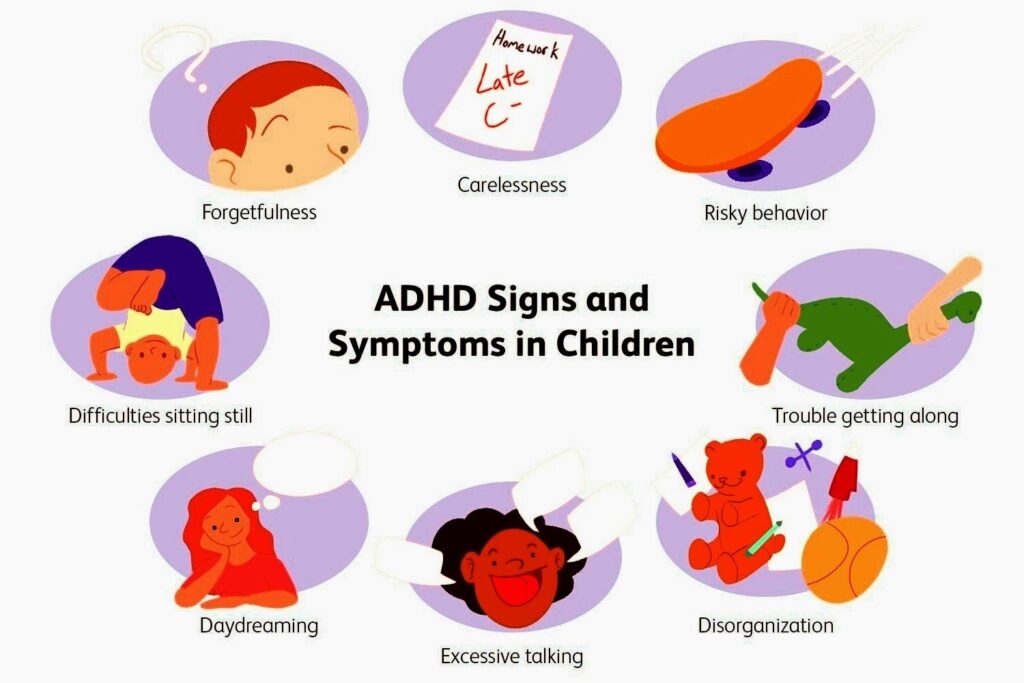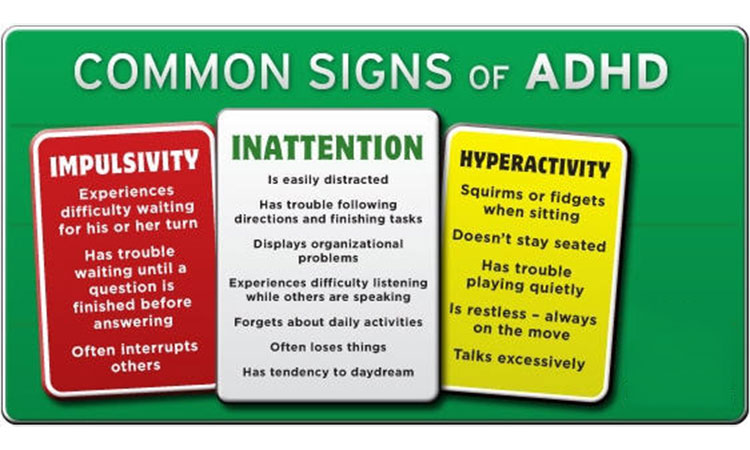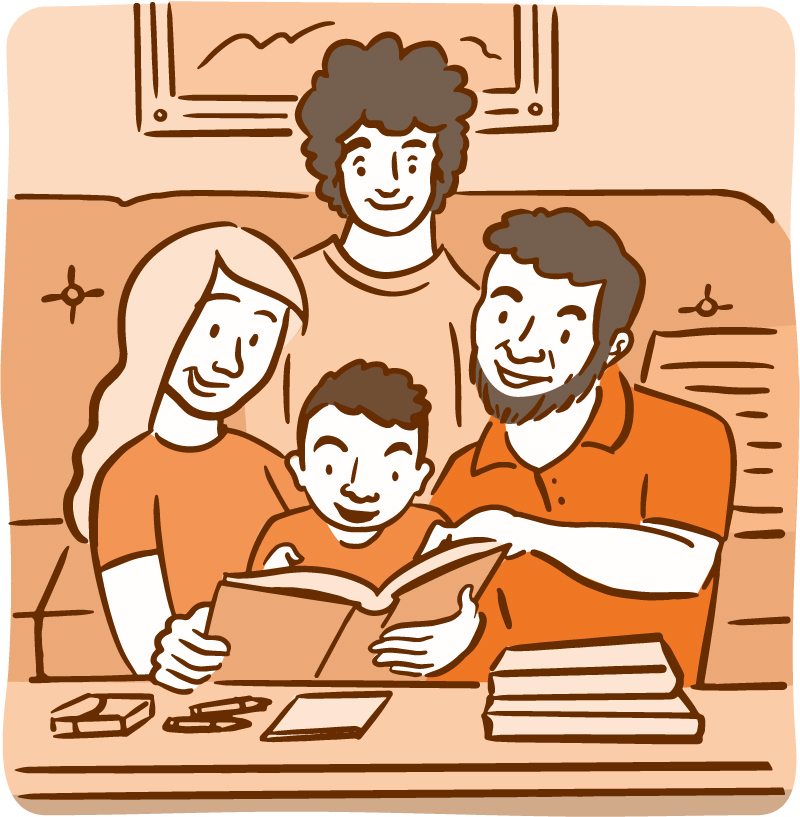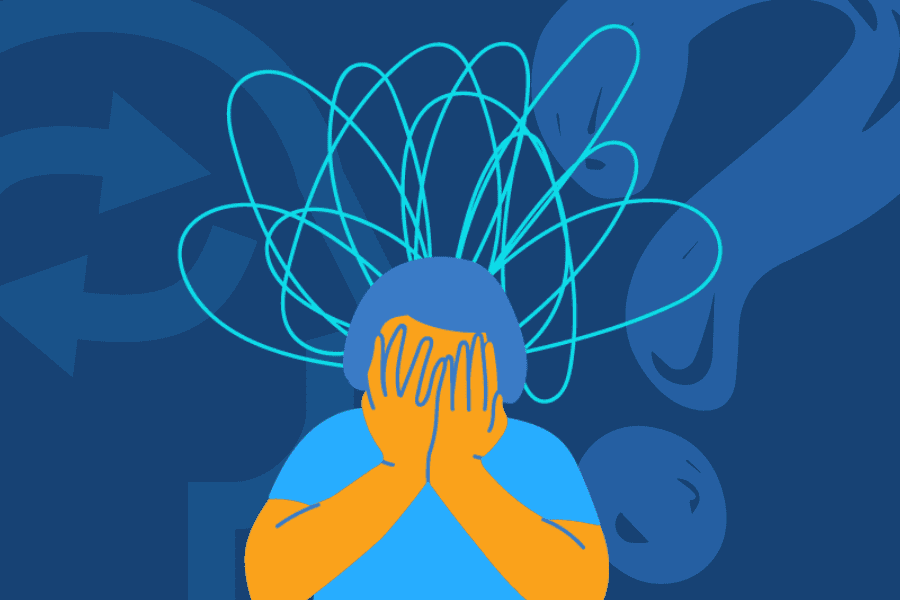❖ Introduction:
The acronym ADHD refers to attention deficit hyperactivity disorder. When the child is not actively paying attention to any activity, it is referred to as a disease or disorder (attention-deficit hyperactivity). It is a disorder that affects brain activity and development affecting self-control. The ability to pay sustained attention and the ability to sit still. A child of any stage can be affected by ADHD. Nowadays, its effect is also seen on young children. Let’s explore this in detail!
Since numerous conditions, including sleep disorders, anxiety, depression, and specific types of learning difficulties, can exhibit symptoms that are similar to those of ADHD, there is no one test that can accurately identify this condition. If you’re concerned about whether a child may have ADHD, check to see if the symptoms match the diagnosis, it involves a method of determining whether a child has ADHD in several steps:-

➢ The most common symptoms of ADHD
- Impatience
- difficulties sitting still
- Constant motion
- Inability to follow given instruction
- Boredom unless constantly entertained
- Interrupting other
- Doing things without thinking/ Impulsive
- Lack of focus
- Distraction
- Disorganization
➢ Main Reason of ADHD:

(a) Impulsivity :
Thinking before acting is referred to as impulsivity. Because of this, young kids frequently take unwarranted risks, yell, won’t wait their turn, and interrupt talks.
(b) Hyperactive:
The most typical way to spot hyperactive kids is when they have trouble following directions. They are easily agitated, irritated, angry, and depressed. They speak too much, hardly ever listen to others, and frequently break up conversations.
(c) Lack of attention:
Children who get distracted easily and show inattention all the time. They face extreme difficulty in staying on target and concentrating. They are also unable to follow the instructions given by parents and teachers properly. Such students also ignore important information. Therefore, this type of tendency and carelessness makes the student stubborn and unusual.
➢ Other reason of ADHD:

(a) Infobesity:
Information overload – “the availability or supply of too much information”.
(b) Decrease Activities :
Healthy life is no less than a boon for the individual and mankind. That’s why it is said that health is wealth. Today, in the era of technology, a person is making the biggest mistake by not paying attention to physical activities.
The side effect of which all kinds of physical, mental and emotional development of the child. Parents should be aware of the importance of physical Activities When children take proper parts in physical activity, then their mental, physical, emotional and character development takes place in a balanced manner.
(c) Decrease connection with Nature (Nature Deficiency):
Young children who do not interact with their environment suffer from health problems like “childhood obesity, asthma, attention deficit/hyperactivity disorder (ADHD), and vitamin D deficiency, all of which have become more common in the US over the past few decades.
➢ Major Parenting Mistakes:
(a) Negative labelling:
When parents labelled to their children. It can affect their senses. Negative labelling make expect the worst, and even positive labels can become a deterrent
A child’s sense of identity is influenced by labels. Similar to how a young kid comes to identify with his name, so he/she can a labelled trait grow as a result of identification with it. For instance, if parents accuse their child of lying regularly, the child may come to believe that he is a liar. As a result, he keeps living up to his reputation as a liar. So that parents should not provide negative labelling to their children
(b) Getting Embarrass on third party comments :
Parents should take care of the respect of the children because if the parents disrespect the children in front of anyone else, then it has an opposite effect on the child’s mind, and the child starts disrespecting the parents. Avoiding the effect of which the child gradually becomes fierce and violent.
(c) Losing parents temper:
It is very important for the parents to control their anger. Many times if the child insists, the parents lose control of their anger and punish the children, which has a negative effect on the child’s brain and the child becomes furious.
We frequently overlook the fact that young children’s brains are still developing in our frustration. Children acquire skills like self-regulation as a result of parents’ attentive and persistent efforts. Therefore, if your child ignores your warning and acts out or disobeys you, it may be because the part of his brain that is responsible for self-control is still developing. On your part, persistence and patience are needed.
➢ Strategies for parents to tackle Child:

1. Communication –
In order to prevent their children from experiencing confusion and uncertainty, parents must maintain open lines of communication and establish clear, few-boundaries about what is acceptable and what is not.
2. Alkaline base food –

If properly implemented, an alkaline diet should consist of 80% alkaline foods. These include beets and squash, as well as nuts, grains, seeds, and other fruits and vegetables, such grapefruit and berries. An alkaline diet would raise the K/Na ratio, which would be beneficial for bone health, muscle preservation, and the prevention of other chronic conditions including hypertension and strokes.
3. Rewards –
Children’s screaming and shouting are quickly recognised, yet sometimes their nice behaviour goes unreported. Don’t forget to praise your kid for good behaviour. Your admiration, time, and attention are frequently the finest rewards for your young children.
4. Screen time –
Parents need to limit screen time of child. Schedule 30 minutes to 1 hour of screen time per day. Many researchers have shown that excessive screen time is also the cause of aggressive behaviour of the child.
5. Seek help –
If you [parents] feel that your child has anger issues, kindly seek help from a professional/ psychologist.
6. Physical activities –
Make sure your youngster participates in regular outdoor activities since it helps them release extra energy and pent-up emotions.
7. Practice what you preach –
Children look up to their parents as role models, so by watching them, they can learn how to manage their emotions and respond accordingly. Therefore, as parents, we must be careful about what we say and do in front of the kids.
8. Yoga and Meditation –

Parents should improve the habits of yoga and meditation in their children since childhood because both are very important for mental and physical development of a child.
Benefits of yoga and Meditation:-
-
-
- Better physical development
- achieving a healthy body
- Increase in concentration.
- Avoiding the tendency to overthink.
- Freedom from stress and anxiety.
- Development of awareness and discretion.
- Better sleep and better health.
- Developing empathy and understanding.
- Developing receptivity and acceptance.
- Increase in self confidence and self esteem
-
➢ SUPPORT GROUPS AND PARENTING SKILLS TRAINING CAN HELP YOU LEARN MORE ABOUT ADHD AND HOW TO PARENT A CHILD WITH THE CONDITION.
In general, Here are a few tips for helping your child’s ADHD:–
✓ Verify that your child gets the recommended amount of sleep for their age.
✓ Keep an eye out for indications that your youngster may be stressed or overstimulated and take action.
✓ Set explicit limits about inappropriate behaviours while rewarding or praising good behaviour.
✓ Playtimes and other social contacts should be kept brief in order to help your children maintain self-control.
✓ Discuss your child’s ADHD with the teacher and the administration of the school. They can explain the application process and assist you in determining whether accommodations would be beneficial.
✓ Many children with ADHD find that regular exercise (30-60 minutes each day) helps them manage some of their symptoms.
✓ These experts can assist your child in learning useful skills and making progress towards their objectives if they are old enough and motivated enough to work with an ADHD coach.
Author: Dr. Alka,
Assistant Professor, CoE (Education Department)
To know more about College of Education, IIMT University, click here.













